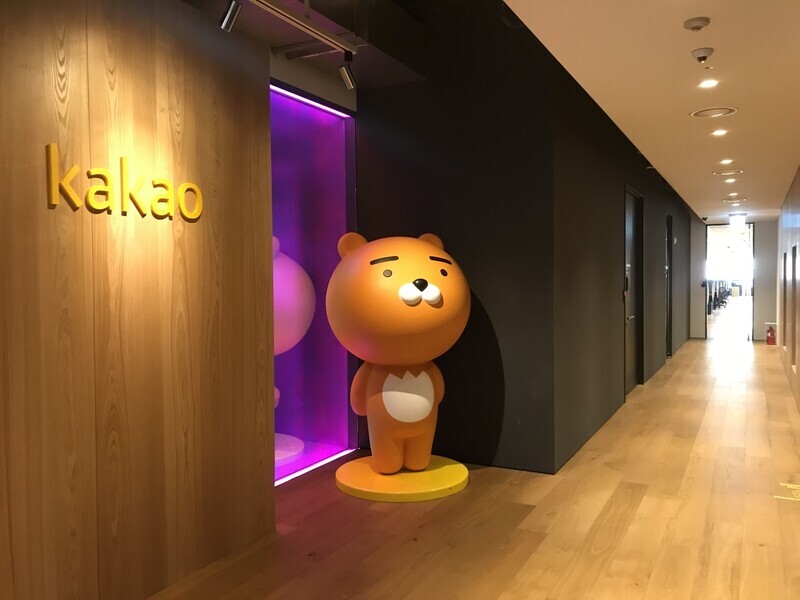hankyoreh
Links to other country sites 다른 나라 사이트 링크
[Column] Can Big Tech be reined in?

The rapid growth of platform companies is rattling the world, and those companies have gotten a shot of adrenaline as many economic activities have moved online during the pandemic. In South Korea, for example, the two biggest platform companies — Naver and Kakao — both had their best quarters ever last year and have entered the top five companies in terms of market capitalization.
Naver and Kakao have a simple profit model: they earn money through monopolistic networks that Koreans access dozens or even hundreds of times a day, starting from the time they wake up in the morning. The two companies loaded their platforms (Naver’s search engine and Kakao’s messaging app) with a smorgasbord of services. They serve as intermediaries for virtually every kind of business: finance, mobility, shopping, gaming, golf and even hair salons.
Their profits come from a range of fees extracted from service providers and customers. These fees function as a kind of toll. Once the structure is in place, the money pours in. In fact, that’s the obvious business strategy for platform companies that have a monopoly on customers and their data. When 70-80 percent of the public is frequenting your store, no matter what you’re selling, it’s going to sell well.
At first, the convenience and efficiency of these powerful tech companies were welcome. Kakao’s ride-hailing service greatly reduced the tedium of flagging down taxis on the street. But once nearly all taxis were registered with Kakao, things started to change. That’s when the company announced a plan to raise its fee for drivers and users. Concerns about the hidden price tag of the tech companies’ enticing services were borne out all too soon.
Are the so-called innovations and customer welfare that they tout something they achieve by raiding our pockets?
Similar questions can be asked about their rapid growth. Kakao commands 158 affiliates — more than either Samsung or SK. Another 40 or so were added in the first half of this year alone.
For the most part, it achieved such a feat by preying on the promising startups that would have been its future competitors. Their expansions outpace the growth of major conglomerates in the past and seem to have no brake lever to speak of.
Investor and labor relations have also been transformed.
These rising tech companies rely on contracted labor instead of hiring. They have exacerbated a massive proliferation of atypical work that can’t be simplified into irregular positions. Should we just accept that companies will foist the rights and responsibilities of employment onto the state and society?
Perhaps conscious of its negative image, Kakao recently came out with measures for mutual growth, including the withdrawal of some projects and reduced transaction fees.
But it’s effectively impossible for a platform company to radically redesign its very profit model — it would be tantamount to demanding that it shut down. Its predator instincts would inevitably start kicking in at some point. That’s what makes it such a serious and thorny issue.
Tech monopolies have been clashing with states and the general public throughout the global market. All over the world, new laws and institutions are being created to regulate the new behemoths — leading many to predict a fierce battle to come.
US President Joe Biden kicked things off by naming “Big Tech killers” to key positions in his administration. US competition authorities hinted at a major increase in regulation, admitting their own failure to curb the mergers and acquisitions that have allowed Big Tech to monopolize resources and grow their turf.
Even China has resorted to regulation after challenging so much of its national resources into its information technology industry. Is a pitched battle with tech giants now at hand?
Monopoly issues also surfaced 20 years ago with Microsoft, which can be said to represent the first generation of Big Tech companies. The US government filed an antitrust suit against Microsoft over its web browser bundling practices.
The eventual ruling ordered a breakup of Microsoft, while founder Bill Gates stepped down from the official management front lines. Reflecting on the antitrust case later on, Gates would say that he erred by not going to Washington, where the executive and legislative branches are located. In other words, he regretted focusing only on the technology, while ignoring the politics.
Twenty years later, Microsoft’s place has been filled by Google, which the US Justice Department filed an antitrust suit against last year.
Gates’s mistake may have provided a lesson. Google spends over US$15 million a year on lobbying in Washington. As a group, the Big Tech companies that emerged from Silicon Valley are official supporters of the Democratic Party.
Google is also one of the key partners cooperating on US national security. It supplies the most data in response to National Security Agency monitoring program requests. Big data companies like Google are poised to play vanguard roles in the Fourth Industrial Revolution and the battle for dominance with China.
Are the US government and Congress capable of turning Big Tech into an adversary? Not a chance.

By Kim Hoe-seung, senior editor
Please direct questions or comments to [english@hani.co.kr]

Editorial・opinion
![[Column] Welcome to the president’s pity party [Column] Welcome to the president’s pity party](https://flexible.img.hani.co.kr/flexible/normal/500/300/imgdb/original/2024/0515/3917157400447943.jpg) [Column] Welcome to the president’s pity party
[Column] Welcome to the president’s pity party![[Editorial] Korea must respond firmly to Japan’s attempt to usurp Line [Editorial] Korea must respond firmly to Japan’s attempt to usurp Line](https://flexible.img.hani.co.kr/flexible/normal/500/300/imgdb/original/2024/0514/2317156736305813.jpg) [Editorial] Korea must respond firmly to Japan’s attempt to usurp Line
[Editorial] Korea must respond firmly to Japan’s attempt to usurp Line- [Editorial] Transfers of prosecutors investigating Korea’s first lady send chilling message
- [Column] Will Seoul’s ties with Moscow really recover on their own?
- [Column] Samsung’s ‘lost decade’ and Lee Jae-yong’s mismatched chopsticks
- [Correspondent’s column] The real reason the US is worried about Chinese ‘overcapacity’
- [Editorial] Yoon’s gesture at communication only highlights his reluctance to change
- [Editorial] Perilous stakes of Trump’s rhetoric around US troop pullout from Korea
- [Guest essay] Preventing Korean Peninsula from becoming front line of new cold war
- [Column] The state is back — but is it in business?
Most viewed articles
- 1[Editorial] Korea must respond firmly to Japan’s attempt to usurp Line
- 2[Editorial] Transfers of prosecutors investigating Korea’s first lady send chilling message
- 3[Column] Welcome to the president’s pity party
- 4Second suspect nabbed for gruesome murder of Korean in Thailand, 1 remains at large
- 5Could Korea’s Naver lose control of Line to Japan?
- 6Major personnel shuffle reassigns prosecutors leading investigations into Korea’s first lady
- 7Naver’s union calls for action from government over possible Japanese buyout of Line
- 8Unexpected rate of AI development requires timely discussion of side effects
- 9US has always pulled troops from Korea unilaterally — is Yoon prepared for it to happen again?
- 10China gains 2 new ambassadors to Korea in form of newborn panda cubs